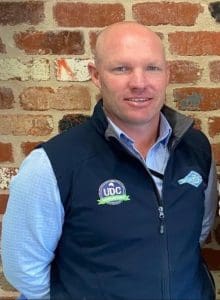
Deakin University Professor Catherine Bennett
COULD regional Victorian meat processors that avoided COVID-19 outbreaks be offered a different deal to the state-wide workforce cuts being applied over the next six weeks?
Deakin University epidemiology chair Professor Catherine Bennett thinks so, but it would mean more detailed evaluations of protections now in place to have significant economic benefits.
She has suggested taking a COVID-19 prevention and evaluation approach that might maximise workforce levels whilst undertaking a more rigorous program of testing workers in high risk but virus-free workplaces.
Her approach would involve actively monitoring for asymptomatic cases whilst generating real data on virus transmission prevention practices.
The approach would depend on the availability of rapid testing to permit regular pre-shift worker screening with quick turn-around results, allowing for immediate implementation of secondary precautions should the virus be found among workers.
Such rapid testing should not only keep workplaces safe, but would also permit evaluation of the government’s now mandatory industry-wide workplace COVID-19 safety measures to prove what actually works to keep workers COVID-safe.
The State Government has made reference to getting tests results within 24 hours, depending on the laboratory. Professor Bennett said utilising rapid testing regionally would depend on having a good local laboratory partnership, to arrange onsite testing across different shifts in a week and for rapid notification to management and the Department of Health and Human Services of any positive results.
Prevention is better than a cure
Professor Bennett said prevention is always better than cure when it comes to coronavirus.
“And if you kill the beast you are going to have a see elimination of transmission, but until we can achieve that State-wide and nationally, what we are talking about is having a manageable level of risk.”
Professor Bennett said the Midfield abattoir story at Warrnambool is “a good one”, in that the plant avoided any COVID-19 infections, despite a potential exposure from a visiting meat inspector who subsequently tested positive.
“It is true though, that you can have many exposures and only one of them is the one that takes off.
“But at the same time, given that it was a known exposure, so one of those natural experiments we can learn from, it shows that they (Midfield) went beyond the call,” she said.
“They had layers of protection, starting with the full PPE — which wasn’t mandatory at the time and may have been the thing that stopped anything happening – but right down to the extra precautions in stepping down quickly and taking everyone off site.
“This would describe something that was much more like best practice,” Professor Bennett said.
“So I do think going ahead, we need to learn from episodes like this.
“It might mean still having a disrupted operation with precautionary short-term closures, and it might still mean that you have to over-react to every possible exposure just to make sure it doesn’t take off, but that seems that might be a longer term workable solution than this working at current restricted workforce (levels).”
Many regional processors are free of COVID-19
It is widely recognised and shown from the recent experience of meat workers in overseas plants and in Melbourne that working in close proximity in a moist, confined environment face an increased risk of COVID-19 transmission.
However, although large COVID-19 outbreaks have been linked to several processors in Melbourne and at Colac, Midfield is among another cohort of large regional meat processors including facilities at Geelong, Ararat and Stawell that have managed to keep infections out of their workforce.
Many of the PPE and workplace practices that were already in most meat processors – especially at the COVID-free facilities — are now being mandated across Victoria’s food processing sector. As well, the Victorian Government has introduced a general 33pc cut in red meat processor workforces, based on levels last month or during a designated three-month peak production period in the last 12 months.
Midfield at Warrnambool is a good example of prevention
Professor Bennett said the challenge about using the Warrnambool story is that it was an example of primary prevention.
“That’s not getting the virus into the workplace; they had an infected person come in who was an inspector, but it is not the same as having a positive worker.”
Despite a government reluctance for testing asymptomatic people, Dr Bennett is arguing for rapid screening of workers in high risk workplaces to detect workers who were incubating the virus but asymptomatic, before they went into work.
“But you need really rapid screening for that to be feasible.”
“There might be other things that could be done that you wouldn’t do for the general community, but you could arguably do in this setting.”
Professor Bennett said whatever is done in these workplace it needs to be evaluated.
“We need to evaluate whether we had to go this hard, we need to know exactly what is actually working”.
“And as part of that, we should be doing more testing just to see whether we have had exposures, and avoided further workplace spread,” she said.
“Have we changed risk because we are limiting it to two thirds of the workforce, or had we already mitigated the risk anyway because no-one took virus in?
“I think it’s harder, because the health department is flying in the dark with some of these things, no-one has found the perfect solution overseas,” Dr Bennett said.
“There is an opportunity here to partner with these places where you’ve got really good compliance, and if you have another early level of testing, as an experiment if you like – to see if they can operate safely but with these extra checks in place to monitor and keep the workplace safe in the short-term.”
“We would learn whether these extra evaluation and prevention checks can be relied on as sufficient in the future,” she said.
“Then, going head, you would not have to have the same intensive swab test regimen.”
“It would just be really helpful, particularly in the regional setting, where the risk is not as high, to combine this evaluation with extra protection to see whether or not we can operate at full capacity without compromising safety.”
Warrnambool is an opportunity to evaluate what works
But Professor Bennett believes focusing on prevention, particularly in a scenario where a known exposure did not result in a cluster, would still need to have that “second, third and fourth fence” of protection.
“That commitment to locking down, the commitment to asking all close contacts to go into isolation and so on, even before you had your test results back.”
“But equally, she said regular testing of workers would be a more “front foot” measure that could keep important but higher risk workplaces operating by detecting the virus before it got in,” she said.
“We could evaluate that and then consider more broadly what is possible, even if you didn’t do it state-wide, but you did it in a part of the state.
“This gives you a way of then testing it more often, increasing your sample size, and just saying that this seems to be both safe and workable … in a regional setting,” she said.
Professor Bennett said the Warrnambool example represented an opportunity in a regional setting to learn from, reinforce and test the meat processing safety measures put in place for the next six weeks.
“You would need those very early detections as a layer of short-term protection.
“This would not be sustainable long-term, and certainly Victoria-wide the government might not be able to deal with that level of testing,” she said.
“But it could be done at least locally to determine what precautions can make workplaces safe, and proven workplace protocols could then expanded more widely regionally.”
Professor Bennett said the pre-workplace testing would be a preventative intervention, as well as important in evaluating the program, but if it didn’t find any positive cases, it could be wound back.
“This could be trialled in one region initially to demonstrate what are safe practices and, prove that Warrnambool wasn’t an aberration “and that’s what could happen every time.”
“That even if the virus gets in, you’ve made the workplace a safe environment with no or very low transmission risk within that.”
Midfield still negotiating position under new restrictions

Midfield general manager Dean McKenna.
Midfield last week said it might have to close because of the proposed workforce restrictions and today was still negotiating its position under the regimen.
Company general manager Dean McKenna believes Victoria’s COVID-free regional meat processors are being unfairly pressured to drop their workforces at a time when they need to lift production leading into the seasonal spring lamb turn-off, placing them at a competitive disadvantage to interstate companies and potentially costing farmers lost money in reduce prices.
Mr McKenna also contends that his company’s experience showed that COVID-19 has been transmitted in communities, but not within the Midfield plant, and that his workers will be at a greater risk of contracting COVID-19 while unemployed.
Southern Grampians mayor Cr Chris Sharples today said Midfield, as the largest meat producer in the state, is vitally important to the Hamilton Regional Livestock Exchange and to the south-west region.
“Midfield management have said they would not be able to sustain a reduction in operations and would be forced to shut the doors completely.
“A full shut down would see about 1000 local people out of work for six weeks and the impact to the economy would be massive,” he said.
“The south-west region cannot afford to take this hit right now.”
“With our local businesses and services already hugely affected by the pandemic, a reduction in operations or forced closure of Midfield would be devastating to our economy.”
“Midfield Management have taken every precaution throughout the pandemic, including having all employees proactively tested and implementing best practice sanitation requirements.
“It would be very disappointing to see them grouped with other abattoirs who are suffering outbreaks when there is nothing to indicate that they are currently at risk.”
Difficult to support the one-in all-in approach – AMIC
Australian Meat Industry Council chief executive officer Patrick Hutchinson said the council has maintained a position that the coronavirus must be stamped out.
“That being said, it is difficult to further support the view that a one-in all-in approach is acceptable when regional areas have not had cases.
“However, the Victorian government has not wanted a two-step processing industry regulatory system and we have to deal with that,” he said.
Mr Hutchinson said the impact of the meat processor workforce cuts in Victoria on farmers is yet to be quantified fully.
“I think that with reduced capacity no doubt we will see issues in areas such as forward contracts or lack thereof.”
Mr Hutchinson said obviously the impact on processing with the virus in certain plants and close contacts and clusters have been high.
“However, the average percentage of staff infections versus overall COVID-19 cases within a cluster linked to Victorian meatworks is about 15pc.
Mr Hutchinson said COVID-19 is a public health issue and a community-transmitted virus, not a meat industry or food safety issue.
“There has been an over-emphasis of cases being linked to the Australian meat industry, yet the virus is being transmitted in the community, not generated from within any particular industry.
“The Australian meat industry has extremely controlled measures in place and should not be viewed through the same lens as meat industries in other countries,” he said.
“The actual percentage of staff that make up the total amount of cases within a “cluster” linked to a meat processing facility is small relative to total community transmissions, in some cases less than 3pc, across our red meat and smallgoods members.
“Further, there is a negligible amount reported in our independent retail butcher chain.”

A practical professor. Five million votes in Melbourne, one million in the regions. So shut the regions down and have a two-hour press conference in Melbourne every day. Go Dan.